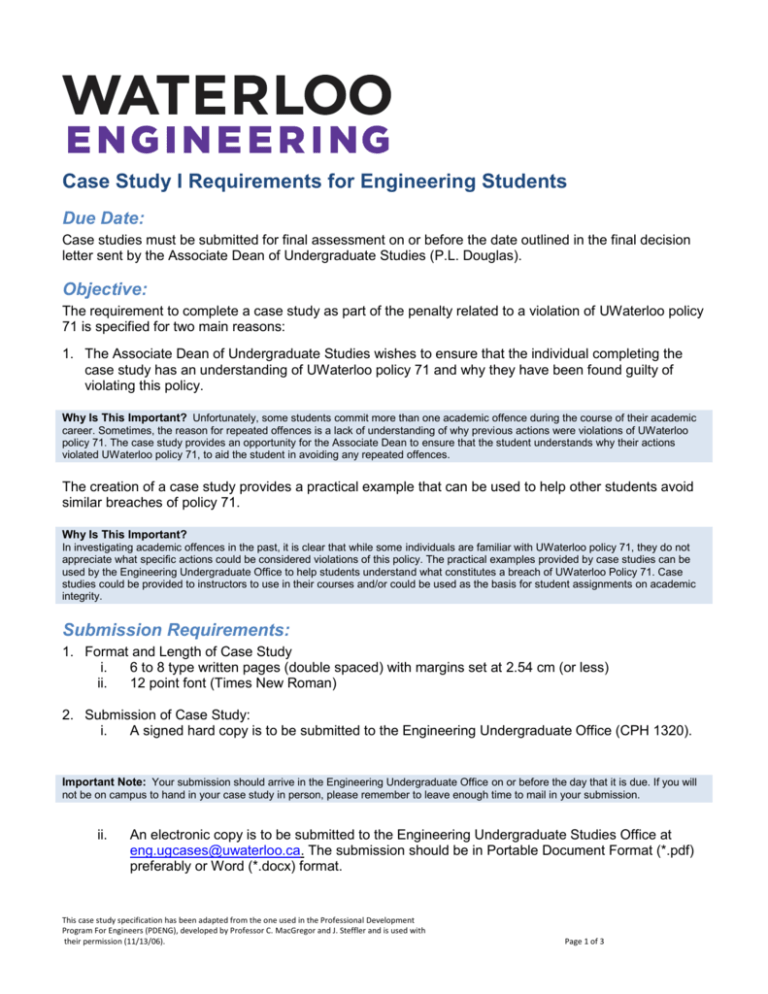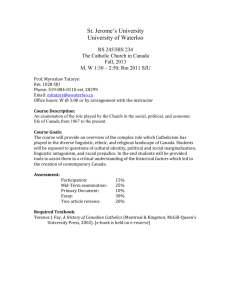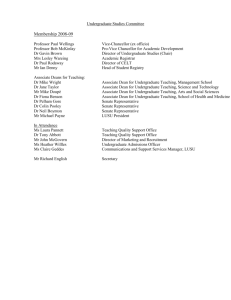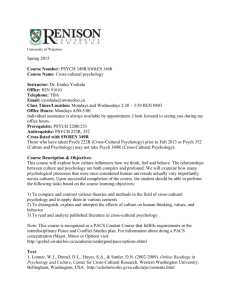UWaterloo Engineering Case Study Requirements: Policy 71
advertisement

Case Study I Requirements for Engineering Students Due Date: Case studies must be submitted for final assessment on or before the date outlined in the final decision letter sent by the Associate Dean of Undergraduate Studies (P.L. Douglas). Objective: The requirement to complete a case study as part of the penalty related to a violation of UWaterloo policy 71 is specified for two main reasons: 1. The Associate Dean of Undergraduate Studies wishes to ensure that the individual completing the case study has an understanding of UWaterloo policy 71 and why they have been found guilty of violating this policy. Why Is This Important? Unfortunately, some students commit more than one academic offence during the course of their academic career. Sometimes, the reason for repeated offences is a lack of understanding of why previous actions were violations of UWaterloo policy 71. The case study provides an opportunity for the Associate Dean to ensure that the student understands why their actions violated UWaterloo policy 71, to aid the student in avoiding any repeated offences. The creation of a case study provides a practical example that can be used to help other students avoid similar breaches of policy 71. Why Is This Important? In investigating academic offences in the past, it is clear that while some individuals are familiar with UWaterloo policy 71, they do not appreciate what specific actions could be considered violations of this policy. The practical examples provided by case studies can be used by the Engineering Undergraduate Office to help students understand what constitutes a breach of UWaterloo Policy 71. Case studies could be provided to instructors to use in their courses and/or could be used as the basis for student assignments on academic integrity. Submission Requirements: 1. Format and Length of Case Study i. 6 to 8 type written pages (double spaced) with margins set at 2.54 cm (or less) ii. 12 point font (Times New Roman) 2. Submission of Case Study: i. A signed hard copy is to be submitted to the Engineering Undergraduate Office (CPH 1320). Important Note: Your submission should arrive in the Engineering Undergraduate Office on or before the day that it is due. If you will not be on campus to hand in your case study in person, please remember to leave enough time to mail in your submission. ii. An electronic copy is to be submitted to the Engineering Undergraduate Studies Office at eng.ugcases@uwaterloo.ca. The submission should be in Portable Document Format (*.pdf) preferably or Word (*.docx) format. This case study specification has been adapted from the one used in the Professional Development Program For Engineers (PDENG), developed by Professor C. MacGregor and J. Steffler and is used with their permission (11/13/06). Page 1 of 3 Important Note: To verify your official UWaterloo identity, please be certain to email your electronic copy from your UWaterloo account. Using your UWaterloo account is also important in the event you encounter technical problems when submitting your case study. UWaterloo cannot verify whether or not you sent a message to or received a message from the Engineering Undergrad Office if you do not use your assignment UWaterloo account. Technical problems encountered with e-mail on an external server that is not maintained by UWaterloo cannot be verified. As such, encountering technical difficulties on such servers is not a valid reason for missing a deadline or seeking an extension for case study submission. Required Content: The Case Study must include the following: 1. Scenario (1-2 pages): i. Describe the situation that led to the breach of Policy 71. ii. Use third-person narrative style and be certain to sanitize the document (i.e., do not include personal identifying information). iii. Remember to use conventional grammar and paragraphing rules. For example, see the book, The Little Brown Compact Handbook (Canadian edition—available from the UWaterloo bookstore). Things to Consider When Preparing Your Scenario Section: o o o Remember that one of the objectives of the Case Study is to help ensure that you understand why your actions were in violation of UWaterloo policy 71. You should include all pertinent information relating to your specific scenario and not a general/fictional violation of UWaterloo policy 71. While you are discussing your specific scenario, do not argue whether or not the situation was in fact a violation of UWaterloo policy 71. The Associate Dean has already made a ruling on this matter, and arguing whether or not the case actually violated UWaterloo policy 71 does not meet the case study’s objectives. Pay close attention to sanitizing your document. Remember that the case study is meant for wide distribution, so personal details should be excluded. Some case studies have used false names for individuals and companies (e.g., Student X), which is acceptable, provided that a statement is made indicating that the names of individuals and other personally identifying details are fictional, to protect the identity of all parties involved. 2. Critique (2-3 pages): i. Analyze the situation from the perspective of the student involved in the situation after the offence has occurred as opposed to what the student was thinking about prior to the offence, and from the perspective of others. At least four different perspectives (including your own) should be considered. ii. Provide insight into the impact the actions of the student can have on others. You should include, at a minimum, the parties whose perspectives you discussed in the previous section. Things to Consider When Preparing Your Critique Section: o o o When looking at the situation from different perspectives, it is helpful to re-read the scenario you have provided as if you were a member of the individual or group whose perspective you are presenting. What would that group or individual think after reading the scenario? The four perspectives are to include: (1) yourself (that is, what do you think about yourself because this offence has occurred); (2) a classmate that may or may not have been involved in the offence; (3) a university official [the instructor, the Associate Dean, the Dean, or other as appropriate]; (4) a prospective or current employer; (5) someone outside of the University of Waterloo [engineering professionals, man-on-the-street, or society in general]. When examining different perspectives, consider the following questions: What would the person/group think about the individuals involved after the offence has occurred? Would the actions that occurred be a concern to the person/group? Why or why not? When looking at the impact of the scenario on others, it is often useful to consider the following questions: Did the person/group have to take any additional actions as a result of the scenario? Might the person/group feel obligated to take any action (e.g., modify policies, procedures, etc.)? Be sure to defend your response. 3. Recommendations (minimum 1 page): Put forward recommendations in the form of guidelines that other students can follow to help them avoid similar breaches of policy 71. This recommendation This case study specification has been adapted from the one used in the Professional Development Program For Engineers (PDENG), developed by Professor C. MacGregor and J. Steffler and is used with their permission (11/13/06). Page 2 of 3 should be specific to the scenario described above. Things to Consider When Preparing Your Recommendations Section: o o Your recommendations should be specific to the scenario you have presented. It should be clear how the recommendation you have provided could have prevented a violation of UWaterloo Policy 71 in your specific case. General recommendations as to how individuals can avoid violating UWaterloo Policy 71 (not related to your specific scenario) are not acceptable. Recommendations generally come in two forms- what could have been done to have prevented the scenario from ever having developed and what different decisions could have been made that would not have violated UWaterloo Policy 71 once the individual found themselves in the scenario in question. References: The following styles of referencing are permitted: American Psychological Association (APA), Modern Language Association of America (MLA), or Institute of Electrical and Electronic Engineers (IEEE). Things to consider when preparing your references section: While references are not necessarily required in all case studies as the case studies are based on UWaterloo policy 71 and personal correspondence from the Associate Dean detailing the reasons why the actions of the individual violated UWaterloo policy 71 would have been sent to the author of the case study, it would be extremely rare for a case study not to have UWaterloo policy 71 and some form of personal communication referenced. Acknowledgments: Input from others (students, faculty, and/or family members) that may have assisted in preparing the case study must be acknowledged. Things to consider when preparing your acknowledgements section: o o Did you discuss your case study with any third party? Did somebody proofread your paper? It is always better to be safe and list any assistance you have received in preparing your case study. If you are using documents that you have prepared for other purposes, you should be referencing these also 1. Assessment: i. The Case Study will be assessed for competency by the Academic Integrity Co-ordinator for Engineering (under the direction of the Associate Dean of Undergraduate Studies). ii. Assessment will be based on the ability of individuals to meet the specifications outlined in these case study requirements. iii. All arguments presented in the case study should be properly defended with appropriate references or links to personal experiences. 2. Important Notes: i. Any requests for extensions or other accommodations related to the case study requirements may be made to the Associate Dean of Engineering via the Academic Integrity Co-ordinator for Engineering. ii. If you have any questions related to the case study requirements, please feel free to contact the Academic Integrity Co-ordinator for Engineering. iii. Your case study must be submitted for final assessment on or before the date outlined in the Final Decision Letter sent by the Associate Dean of Undergraduate Studies (P.L. Douglas). If you will not be on campus to hand in the hard copy of your case study in person, please remember to leave enough time to mail in your submission. This case study specification has been adapted from the one used in the Professional Development Program For Engineers (PDENG), developed by Professor C. MacGregor and J. Steffler and is used with their permission (11/13/06). Page 3 of 3









